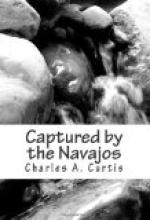“I fear not. She ought to have a woman’s gentle care, for one thing, and some remedies and appliances I haven’t with me for such a delicate case. It is the long distance between here and the fort, and the rough road, that make the outlook hopeless. She cannot survive such a journey.”
“Then we will remain here, doctor,” said I. “Write out a list of what you want, and I will send a man to Whipple for tents and supplies, a camp woman, Frank, Vic, and the elder Arnold girl.”
“Duncan, you are inspired!” exclaimed the doctor. “I’ll have my order ready by the time the messenger reports, and then we’ll make Brenda comfortable.”
A letter was written to Captain Bayard, the surgeon’s memoranda enclosed, and a quarter of an hour afterwards fleet-footed Sancho was flying over the sixty miles to Fort Whipple as fast as Private Tom Clary could ride him. Three days later a pack-train arrived, with a laundress from the infantry company, Frank Burton, and Mary Arnold, and with stores and supplies necessary for setting up a sick-camp. The wounded girl mended rapidly from the start.
In due time Brenda recovered sufficiently to bear transportation to Prescott, where she joined her uncle and cousins. Rapid changes quickly followed. I received orders directing me to report for duty at once at the Seabury Military School, and by the same mail came letters from Colonel Burton directing his sons to accompany me. At the end of the next fortnight, just as we were packed for a journey to the Pacific coast, Brenda received instructions from her maternal relatives to make the same journey, and joined us.
Frank and Henry’s project to transport their ponies East, and their plans for Manuel and Sapoya, were also carried out. Boys and ponies became a prominent contingent to the corps of cadets under my military instruction during the following three years.
Later, Henry went to West Point and became an officer of the army. Frank and Manuel went to college, the former becoming a distinguished civil engineer and the latter a prominent business man. Sapoya closed his school career at Seabury, and rejoined his people in the Indian Territory, becoming a valued and respected leader of his people.
On a beautiful lawn before a fine mansion on the eastern shore of the Hudson River, beneath the shade of a stately elm, stands a small monument, upon the top of which rests a finely chiselled model of a setter dog. Beneath, on a bronze tablet, is engraved:
“BENEATH THIS STONE LIES
VICTORIANA, THE LOVED
AND ESTEEMED FRIEND OF
CHARLES ALFRED DUNCAN,
FRANK DOUGLAS BURTON,
BRENDA ARNOLD BURTON,
HENRY FRANCIS BURTON,
MANUEL AUGUSTINE PEREA Y LUNA,
SAPOYA SNOYGON PEREA.”



